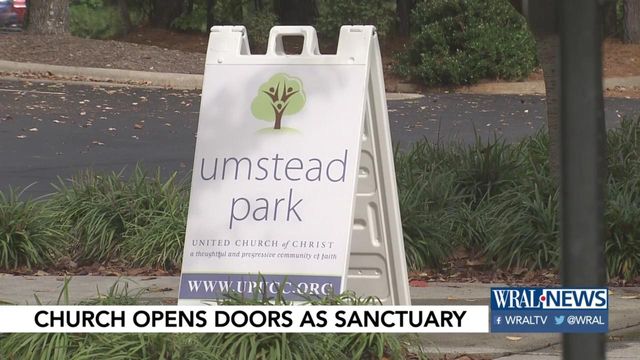North Raleigh church offers sanctuary to man facing deportation
A Raleigh church is making good on its promise to house undocumented immigrants less than a month after voting to open its doors as a sanctuary.
Posted — UpdatedUmstead Park United Church of Christ, at 8208 Brownleigh Drive, is the first church in Wake County to provide sanctuary to people facing deportation.
"We explored all the possibilities we could, then went back to congregation in late September and said, 'We believe it is possible for us to do this. We believe it is just for us to do this as a congregation," Rev. Doug Long said Tuesday.
Ninety-six percent of the congregation voted in favor of offering sanctuary, Long said.
"No one was angry, no one left, and everyone’s here together," he said.
This week, the church welcomed Eliseo Jiminez, who came to the U.S. illegally with his wife about 20 years ago. He was deported in 2007 after he was arrested for driving without a license, but he returned a month later.
For the past four years, Jiminez has obtained approval annually for a stay of deportation, has routinely checked in with Immigration and Customs Enforcement agents and has maintained a valid work permit, but his request for another renewal of the stay of deportation was denied in July, according to Viridiana Martinez of Alerta Migratoria NC, a Durham-based group that works with undocumented immigrants seeking asylum.
"Unfortunately, with the new administration, that stay of deportation was no longer approved, and since July ... he’s not supposed to be in the country," Martinez said.
"I can’t give up. I have to fight because my kids need me, they need me in this country," Jiminez said.
He and his wife have four children, ranging in age from 18 to 4, all of whom were born in the U.S.
He now sleeps on a makeshift bed in a small room in the Raleigh church, enjoying occasional visits from his wife and children.
"If we as a congregation can provide for a family time for their lawyer to explore due process, time for their advocates to plea for a stay of their deportation and, hopefully, time for laws to catch up with the system that is very inconsistent and unjust right now, then that’s what we want to do," Long said.
ICE policy is not to make arrests at churches, schools or hospitals.
"What we’re doing, we’re doing publicly, and we’re doing it within the understanding of the law that we’re aware of," Long said. "There has not been a church in the recent past that has been charged in any way. ... It’s a gray area that we’re willing to move into and explore."
• Credits
Copyright 2024 by Capitol Broadcasting Company. All rights reserved. This material may not be published, broadcast, rewritten or redistributed.






